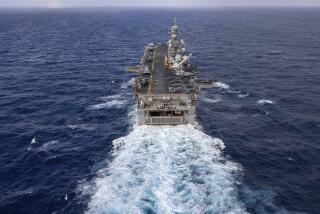U.S.-Saudi Blanketing of Gulf by AWACS Seen : Talks ‘Going Smoothly’ on Increased Patrols to Guard Threatened Shipping, State Dept. Says
- Share via
WASHINGTON — The United States and Saudi Arabia are nearing an agreement to extend the radar surveillance of Saudi AWACS planes to the entire Persian Gulf to help U.S. forces protect shipping there, State Department officials said Friday.
Department spokesman Phyllis Oakley confirmed that negotiations are “going smoothly, and we believe that we and the Saudis will work out a favorable arrangement very soon.”
One official said that the agreement could extend the coverage of five Saudi-owned AWACS (airborne warning and control system) planes and four U.S.-owned, Saudi-based AWACS craft to the southern part of the 600-mile-long gulf.
Patrolling Over Oil Fields
The Air Force-operated U.S. planes have been patrolling airspace over major Saudi oil fields in the northern gulf area since 1980. The Saudi-owned planes, on which Saudi crews are being trained by U.S. instructors, have been operating since Congress authorized the sale of the American-made planes to the Arab state in 1982.
Security of the region is of paramount concern to the Administration, which is planning to provide military escorts for 11 Kuwaiti tankers to underscore U.S. determination to keep open the gulf’s international sea lanes. Fears about the safety of U.S. servicemen in the area, where Iran and Iraq have been at war for 6 1/2 years, were heightened after the May 17 Iraqi missile attack on the Navy frigate Stark that killed 37 sailors.
In addition to the tankers, which have been re-registered under the U.S. flag, Oakley said that Kuwait is discussing the possible chartering of “under 10” U.S. ships for undetermined use. She did not specify whether those ships would be tankers or cargo vessels but said, “If some charter arrangement could be worked out, it would not supplant the reflagging arrangement which we have now worked out with the Kuwaitis.”
Oakley said she had no information about whether Saudi Arabia is being asked to grant landing rights to U.S. carrier-borne aircraft, which will take part in the escort force. Jets flying from a carrier in the Arabian Sea would be at the limit of their range in the northern end of the gulf and would require land bases or midair refueling.
Nor was Oakley able to say whether Saudi F-15 fighter jets, which normally escort the AWACS planes, will be authorized to fend off attackers of gulf shipping. When the Stark was attacked, the F-15s did not pursue the Iraqi attacker because they lacked proper Saudi authorization.
After that disclosure, which drew a storm of congressional criticism, the Administration withdrew its plan to sell a dozen additional F-15s to Saudi Arabia. In addition, only last week the Administration shelved a proposed sale of Maverick anti-tank missiles to the Arab state in the face of opposition by Congress.
Rep. Les Aspin (D-Wis.), chairman of the House Armed Services Committee, indicated another area of congressional discontent when he accused the Pentagon of deliberately seeking to mislead Congress about Iran’s threat to retaliate against the Administration’s planned escort of the Kuwaiti tankers. Aspin said that committee members were “aghast” upon finding out that the CIA had not been asked to assess the threat before the escort proposal was announced Tuesday.
Although the Pentagon report to Congress rated the threat from Iran as “low to moderate,” CIA officials told Congress that the risk was high for “unconventional” attacks, such as terrorist acts. Aspin said that Defense Department witnesses explained Friday that their assessment covered only a few months and was premised on a direct attack against U.S. forces.
“There’s a lot of suspicion about this report,” the committee chairman said of the Defense Department report.
Aroused Suspicion
Similarly, Sen. William S. Cohen (R-Me.) said that the Pentagon report had aroused such suspicion when the Senate Intelligence Committee heard CIA and Defense Department witnesses in closed session Friday. “The problem right now is that the decision (to escort) has been made and the analysis (of the threat) was made after the decision,” Cohen said.
An interagency consulting process exists to work out any discrepancies in intelligence estimates, but it broke down on two levels in the case of the escort report, an intelligence official said: Not only was the CIA not consulted in advance, but neither Defense Secretary Caspar W. Weinberger nor White House National Security Adviser Frank C. Carlucci was informed of this failure.
More to Read
Sign up for Essential California
The most important California stories and recommendations in your inbox every morning.
You may occasionally receive promotional content from the Los Angeles Times.














